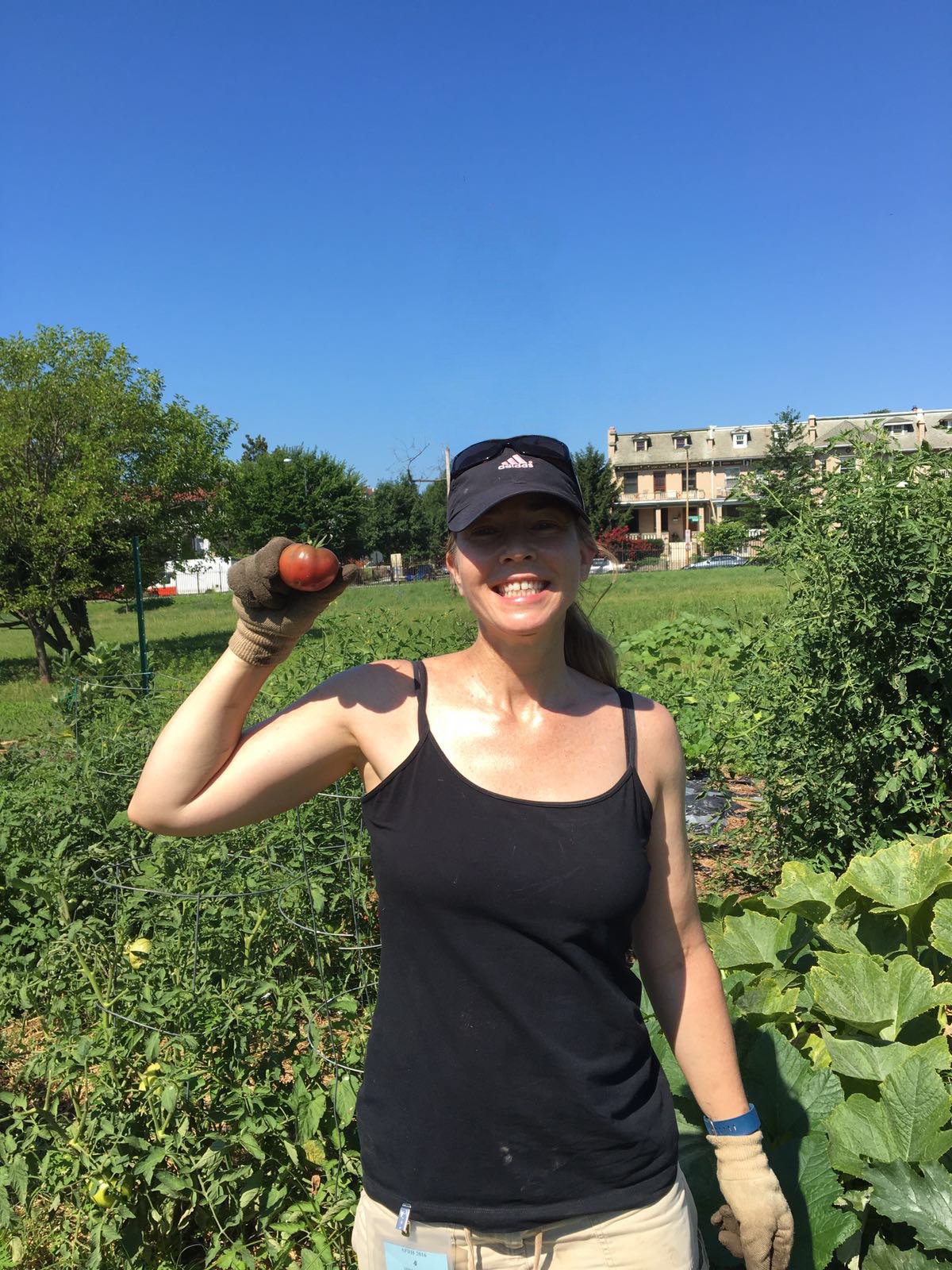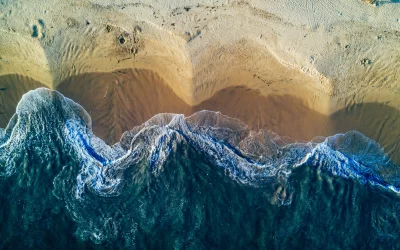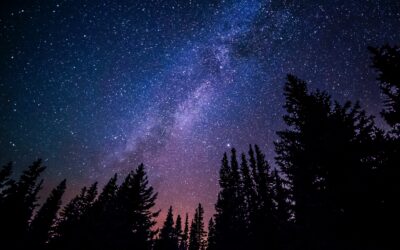Outside
Climate Change and the Outdoors, i.e., Our World
We forget this so many times each day – the outside world. But it is the foundation of life, providing the air we breathe, the water we drink, our food, and all the animals, plants and other life keep the plants pollinated, and circulate the nutrients, including sequestering carbon for decades in trees and soil. How do we help the outdoors do its job now that there is a strong release of ancient, fossil carbon into the system? Can we put that carbon back in the ground? We, emphasizing us regular folks, can do this, not just governments.
Climate Steps: Outside

Avoid gas-powered leaf blowers

Bike instead of drive

Support whale conservation
Averaged over 2015—2017, global loss of tropical forests contributed about 4.8 billion tonnes of carbon dioxide per year (or about 8-10% of annual human emissions of carbon dioxide).
LEARN MORE
About Climate Change and Outdoors

Linda Cotton, holding a tomato from her jointly held community garden in Washington, DC.
A new page we are developing that will feature a round-up of information. But first, we’ll highlight some articles we’ve written about our environment, our outdoors — the thing we think we don’t absolutely need and often don’t think about, but which, really, is the foundation of life, providing the air and water we breath, the food via pollinators, the animals and other life that support the nutrient recycling – everything.
Yards, Landscapes, and those Edges along Curbs:https://www.newscientist.com/article/2152509-why-burying-loved-ones-in-unmarked-graves-could-save-wildlife/
WATER
- WaterSense is a water-saving certification for bathroom equipment, such as showerheads, toilets, faucets, plus irrigation controls, sprinklers, etc. Being sensible about water is directly linked to climate change resilience. We already have done-in so many water resources, but climate-related drought and heat will greatly change our water resources further. We must preserve them.
WaterSense Product Search (epa.gov)
Outside Articles
Let it Shine: Creative Ways to Use Solar Energy for Your Property
Image source: Deposit photos Guest author: Annie Button, UK Earth Hour 2024, on the 23rd March at 8:30 pm, is an important moment to set aside to reflect on our collective use of energy and how it impacts our environment. With its symbolic ‘lights off’ message, it...
Better access to fresh, local food helps your community fight climate change
A wonderful, essential concept to build your community around is food. There are three main areas in which we can do so. First, by working with our neighbors to improve our community’s access to local, fresh food, we can spend more time in healthy environments while...
Pollinating Ideas and Planting their Seeds
We are in the first week of June and the global atmospheric CO2 level is 424.44 ppm, as compared to 420.69 ppm a year ago. When I was born in 1954, the average was 313.20 ppm. For the past several weeks, there've been statements from scientists at the United...
It’s Not Too Late to Turn the Tide on Climate
That is, if everyone, everywhere, acts all at once on Climate. Here's what you can do. Have you been wondering – or maybe worrying – if it’s possible to reduce greenhouse gas (GHG) emissions by half by 2030 and to get to net-zero by 2050? While the climate...
Our Social/Community-level Actions are Here!
NEWS! - Mark Stewart has just wound up a series of pages about the impact of individuals leading and joining COMMUNITIES in terms of fighting the climate crisis - and adapting to climate disasters. So check out our new Social/Community Section!...
Protect the Night
People light up the night almost without thinking, as we have for millennia. At the minimal level, we do this instinctively for our survival and protection. But the practice has grown to destructive extremes in modern societies. With a lack of understanding and...
Videos About Climate Change and Outdoors
- https://www.newscientist.com/article/2152509-why-burying-loved-ones-in-unmarked-graves-could-save-wildlife/
- https://www.washingtonpost.com/science/eco-friendly-cemeteries-more-people-preferring-green-over-standard-burials/2019/11/29/af9de6ce-0fc5-11ea-bf62-eadd5d11f559_story.html?
- https://www.funeraldirect.co/cremation-burial-environmentally-friendly/ (Interesting, but I don’t think they factor in climate change, which is the overarching, most important environmental impact now.
- https://cremationinstitute.com/cremation-vs-burial/ (same for this one, but it provides a lot of info.)
WATER
- WaterSense is a water-saving certification for bathroom equipment, such as showerheads, toilets, faucets, plus irrigation controls, sprinklers, etc. Being sensible about water is directly linked to climate change resilience. We already have done-in so many water resources, but climate-related drought and heat will greatly change our water resources further. We must preserve them.
WaterSense Product Search (epa.gov)
[/et_pb_text][/et_pb_column][/et_pb_row][/et_pb_section]
Outside Articles
Let it Shine: Creative Ways to Use Solar Energy for Your Property
Image source: Deposit photos Guest author: Annie Button, UK Earth Hour 2024, on the 23rd March at 8:30 pm, is an important moment to set aside to reflect on our collective use of energy and how it impacts our environment. With its symbolic ‘lights off’ message, it...
Better access to fresh, local food helps your community fight climate change
A wonderful, essential concept to build your community around is food. There are three main areas in which we can do so. First, by working with our neighbors to improve our community’s access to local, fresh food, we can spend more time in healthy environments while...
Pollinating Ideas and Planting their Seeds
We are in the first week of June and the global atmospheric CO2 level is 424.44 ppm, as compared to 420.69 ppm a year ago. When I was born in 1954, the average was 313.20 ppm. For the past several weeks, there've been statements from scientists at the United...
It’s Not Too Late to Turn the Tide on Climate
That is, if everyone, everywhere, acts all at once on Climate. Here's what you can do. Have you been wondering – or maybe worrying – if it’s possible to reduce greenhouse gas (GHG) emissions by half by 2030 and to get to net-zero by 2050? While the climate...
Our Social/Community-level Actions are Here!
NEWS! - Mark Stewart has just wound up a series of pages about the impact of individuals leading and joining COMMUNITIES in terms of fighting the climate crisis - and adapting to climate disasters. So check out our new Social/Community Section!...
Protect the Night
People light up the night almost without thinking, as we have for millennia. At the minimal level, we do this instinctively for our survival and protection. But the practice has grown to destructive extremes in modern societies. With a lack of understanding and...
Videos About Climate Change and Outdoors

Photo by Min An from Pexels.
Planting Trees – Yourself, through Donations, and more
- “Dedicate a tree as a gift” https://www.treesforachange.com/, e.g., happy occasions, memorials for a friend or colleague, and thank you’s for help given in the fight against climate change.
- Gift a tree through the green search engine Ecosia – they have a page dedicated to how to donate the planting of a tree(s). https://plant.ecosia.org/.
- Dedicate a tree planting, and provide job training at the same time. https://treetrust.org/donate/
- The USDA Forest Service Plant-A-Tree Program was established in 1983. https://www.fs.usda.gov/working-with-us/donations/plant-a-tree.
Burials
Okay, weird, but if you think about it, most burials are outside (minus cremation urns kept inside.) We’re going to expand on this section in the near future, but here are some interesting articles about green burials, especially in the U.S. So far options include: standard burial (not green at all), pine box burial, shroud burial, forest groves burial, cremation (not as green as one think), cremation and burial with a tree seed, biodegradable pod burial – often with a seed, water/chemical cremation (seems pretty green), and composting (only in Washington State in U.S.) Enjoy the read!
- https://www.newscientist.com/article/2152509-why-burying-loved-ones-in-unmarked-graves-could-save-wildlife/
- https://www.washingtonpost.com/science/eco-friendly-cemeteries-more-people-preferring-green-over-standard-burials/2019/11/29/af9de6ce-0fc5-11ea-bf62-eadd5d11f559_story.html?
- https://www.funeraldirect.co/cremation-burial-environmentally-friendly/ (Interesting, but I don’t think they factor in climate change, which is the overarching, most important environmental impact now.
- https://cremationinstitute.com/cremation-vs-burial/ (same for this one, but it provides a lot of info.)
WATER
- WaterSense is a water-saving certification for bathroom equipment, such as showerheads, toilets, faucets, plus irrigation controls, sprinklers, etc. Being sensible about water is directly linked to climate change resilience. We already have done-in so many water resources, but climate-related drought and heat will greatly change our water resources further. We must preserve them.
WaterSense Product Search (epa.gov)
[/et_pb_text][/et_pb_column][/et_pb_row][/et_pb_section]
Outside Articles
Let it Shine: Creative Ways to Use Solar Energy for Your Property
Image source: Deposit photos Guest author: Annie Button, UK Earth Hour 2024, on the 23rd March at 8:30 pm, is an important moment to set aside to reflect on our collective use of energy and how it impacts our environment. With its symbolic ‘lights off’ message, it...
Better access to fresh, local food helps your community fight climate change
A wonderful, essential concept to build your community around is food. There are three main areas in which we can do so. First, by working with our neighbors to improve our community’s access to local, fresh food, we can spend more time in healthy environments while...
Pollinating Ideas and Planting their Seeds
We are in the first week of June and the global atmospheric CO2 level is 424.44 ppm, as compared to 420.69 ppm a year ago. When I was born in 1954, the average was 313.20 ppm. For the past several weeks, there've been statements from scientists at the United...
It’s Not Too Late to Turn the Tide on Climate
That is, if everyone, everywhere, acts all at once on Climate. Here's what you can do. Have you been wondering – or maybe worrying – if it’s possible to reduce greenhouse gas (GHG) emissions by half by 2030 and to get to net-zero by 2050? While the climate...
Our Social/Community-level Actions are Here!
NEWS! - Mark Stewart has just wound up a series of pages about the impact of individuals leading and joining COMMUNITIES in terms of fighting the climate crisis - and adapting to climate disasters. So check out our new Social/Community Section!...
Protect the Night
People light up the night almost without thinking, as we have for millennia. At the minimal level, we do this instinctively for our survival and protection. But the practice has grown to destructive extremes in modern societies. With a lack of understanding and...
Videos About Climate Change and Outdoors

Photo by Min An from Pexels.
Planting Trees – Yourself, through Donations, and more
- “Dedicate a tree as a gift” https://www.treesforachange.com/, e.g., happy occasions, memorials for a friend or colleague, and thank you’s for help given in the fight against climate change.
- Gift a tree through the green search engine Ecosia – they have a page dedicated to how to donate the planting of a tree(s). https://plant.ecosia.org/.
- Dedicate a tree planting, and provide job training at the same time. https://treetrust.org/donate/
- The USDA Forest Service Plant-A-Tree Program was established in 1983. https://www.fs.usda.gov/working-with-us/donations/plant-a-tree.
Burials
Okay, weird, but if you think about it, most burials are outside (minus cremation urns kept inside.) We’re going to expand on this section in the near future, but here are some interesting articles about green burials, especially in the U.S. So far options include: standard burial (not green at all), pine box burial, shroud burial, forest groves burial, cremation (not as green as one think), cremation and burial with a tree seed, biodegradable pod burial – often with a seed, water/chemical cremation (seems pretty green), and composting (only in Washington State in U.S.) Enjoy the read!
- https://www.newscientist.com/article/2152509-why-burying-loved-ones-in-unmarked-graves-could-save-wildlife/
- https://www.washingtonpost.com/science/eco-friendly-cemeteries-more-people-preferring-green-over-standard-burials/2019/11/29/af9de6ce-0fc5-11ea-bf62-eadd5d11f559_story.html?
- https://www.funeraldirect.co/cremation-burial-environmentally-friendly/ (Interesting, but I don’t think they factor in climate change, which is the overarching, most important environmental impact now.
- https://cremationinstitute.com/cremation-vs-burial/ (same for this one, but it provides a lot of info.)
WATER
- WaterSense is a water-saving certification for bathroom equipment, such as showerheads, toilets, faucets, plus irrigation controls, sprinklers, etc. Being sensible about water is directly linked to climate change resilience. We already have done-in so many water resources, but climate-related drought and heat will greatly change our water resources further. We must preserve them.
WaterSense Product Search (epa.gov)
[/et_pb_text][/et_pb_column][/et_pb_row][/et_pb_section]
Outside Articles
Let it Shine: Creative Ways to Use Solar Energy for Your Property
Image source: Deposit photos Guest author: Annie Button, UK Earth Hour 2024, on the 23rd March at 8:30 pm, is an important moment to set aside to reflect on our collective use of energy and how it impacts our environment. With its symbolic ‘lights off’ message, it...
Better access to fresh, local food helps your community fight climate change
A wonderful, essential concept to build your community around is food. There are three main areas in which we can do so. First, by working with our neighbors to improve our community’s access to local, fresh food, we can spend more time in healthy environments while...
Pollinating Ideas and Planting their Seeds
We are in the first week of June and the global atmospheric CO2 level is 424.44 ppm, as compared to 420.69 ppm a year ago. When I was born in 1954, the average was 313.20 ppm. For the past several weeks, there've been statements from scientists at the United...
It’s Not Too Late to Turn the Tide on Climate
That is, if everyone, everywhere, acts all at once on Climate. Here's what you can do. Have you been wondering – or maybe worrying – if it’s possible to reduce greenhouse gas (GHG) emissions by half by 2030 and to get to net-zero by 2050? While the climate...
Our Social/Community-level Actions are Here!
NEWS! - Mark Stewart has just wound up a series of pages about the impact of individuals leading and joining COMMUNITIES in terms of fighting the climate crisis - and adapting to climate disasters. So check out our new Social/Community Section!...
Protect the Night
People light up the night almost without thinking, as we have for millennia. At the minimal level, we do this instinctively for our survival and protection. But the practice has grown to destructive extremes in modern societies. With a lack of understanding and...
Videos About Climate Change and Outdoors

Photo by Min An from Pexels.
Planting Trees – Yourself, through Donations, and more
- “Dedicate a tree as a gift” https://www.treesforachange.com/, e.g., happy occasions, memorials for a friend or colleague, and thank you’s for help given in the fight against climate change.
- Gift a tree through the green search engine Ecosia – they have a page dedicated to how to donate the planting of a tree(s). https://plant.ecosia.org/.
- Dedicate a tree planting, and provide job training at the same time. https://treetrust.org/donate/
- The USDA Forest Service Plant-A-Tree Program was established in 1983. https://www.fs.usda.gov/working-with-us/donations/plant-a-tree.
Burials
Okay, weird, but if you think about it, most burials are outside (minus cremation urns kept inside.) We’re going to expand on this section in the near future, but here are some interesting articles about green burials, especially in the U.S. So far options include: standard burial (not green at all), pine box burial, shroud burial, forest groves burial, cremation (not as green as one think), cremation and burial with a tree seed, biodegradable pod burial – often with a seed, water/chemical cremation (seems pretty green), and composting (only in Washington State in U.S.) Enjoy the read!
- https://www.newscientist.com/article/2152509-why-burying-loved-ones-in-unmarked-graves-could-save-wildlife/
- https://www.washingtonpost.com/science/eco-friendly-cemeteries-more-people-preferring-green-over-standard-burials/2019/11/29/af9de6ce-0fc5-11ea-bf62-eadd5d11f559_story.html?
- https://www.funeraldirect.co/cremation-burial-environmentally-friendly/ (Interesting, but I don’t think they factor in climate change, which is the overarching, most important environmental impact now.
- https://cremationinstitute.com/cremation-vs-burial/ (same for this one, but it provides a lot of info.)
WATER
- WaterSense is a water-saving certification for bathroom equipment, such as showerheads, toilets, faucets, plus irrigation controls, sprinklers, etc. Being sensible about water is directly linked to climate change resilience. We already have done-in so many water resources, but climate-related drought and heat will greatly change our water resources further. We must preserve them.
WaterSense Product Search (epa.gov)
[/et_pb_text][/et_pb_column][/et_pb_row][/et_pb_section]
Outside Articles
Let it Shine: Creative Ways to Use Solar Energy for Your Property
Image source: Deposit photos Guest author: Annie Button, UK Earth Hour 2024, on the 23rd March at 8:30 pm, is an important moment to set aside to reflect on our collective use of energy and how it impacts our environment. With its symbolic ‘lights off’ message, it...
Better access to fresh, local food helps your community fight climate change
A wonderful, essential concept to build your community around is food. There are three main areas in which we can do so. First, by working with our neighbors to improve our community’s access to local, fresh food, we can spend more time in healthy environments while...
Pollinating Ideas and Planting their Seeds
We are in the first week of June and the global atmospheric CO2 level is 424.44 ppm, as compared to 420.69 ppm a year ago. When I was born in 1954, the average was 313.20 ppm. For the past several weeks, there've been statements from scientists at the United...
It’s Not Too Late to Turn the Tide on Climate
That is, if everyone, everywhere, acts all at once on Climate. Here's what you can do. Have you been wondering – or maybe worrying – if it’s possible to reduce greenhouse gas (GHG) emissions by half by 2030 and to get to net-zero by 2050? While the climate...
Our Social/Community-level Actions are Here!
NEWS! - Mark Stewart has just wound up a series of pages about the impact of individuals leading and joining COMMUNITIES in terms of fighting the climate crisis - and adapting to climate disasters. So check out our new Social/Community Section!...
Protect the Night
People light up the night almost without thinking, as we have for millennia. At the minimal level, we do this instinctively for our survival and protection. But the practice has grown to destructive extremes in modern societies. With a lack of understanding and...
Videos About Climate Change and Outdoors

Photo by Min An from Pexels.
Planting Trees – Yourself, through Donations, and more
- “Dedicate a tree as a gift” https://www.treesforachange.com/, e.g., happy occasions, memorials for a friend or colleague, and thank you’s for help given in the fight against climate change.
- Gift a tree through the green search engine Ecosia – they have a page dedicated to how to donate the planting of a tree(s). https://plant.ecosia.org/.
- Dedicate a tree planting, and provide job training at the same time. https://treetrust.org/donate/
- The USDA Forest Service Plant-A-Tree Program was established in 1983. https://www.fs.usda.gov/working-with-us/donations/plant-a-tree.
Burials
Okay, weird, but if you think about it, most burials are outside (minus cremation urns kept inside.) We’re going to expand on this section in the near future, but here are some interesting articles about green burials, especially in the U.S. So far options include: standard burial (not green at all), pine box burial, shroud burial, forest groves burial, cremation (not as green as one think), cremation and burial with a tree seed, biodegradable pod burial – often with a seed, water/chemical cremation (seems pretty green), and composting (only in Washington State in U.S.) Enjoy the read!
- https://www.newscientist.com/article/2152509-why-burying-loved-ones-in-unmarked-graves-could-save-wildlife/
- https://www.washingtonpost.com/science/eco-friendly-cemeteries-more-people-preferring-green-over-standard-burials/2019/11/29/af9de6ce-0fc5-11ea-bf62-eadd5d11f559_story.html?
- https://www.funeraldirect.co/cremation-burial-environmentally-friendly/ (Interesting, but I don’t think they factor in climate change, which is the overarching, most important environmental impact now.
- https://cremationinstitute.com/cremation-vs-burial/ (same for this one, but it provides a lot of info.)
WATER
- WaterSense is a water-saving certification for bathroom equipment, such as showerheads, toilets, faucets, plus irrigation controls, sprinklers, etc. Being sensible about water is directly linked to climate change resilience. We already have done-in so many water resources, but climate-related drought and heat will greatly change our water resources further. We must preserve them.
WaterSense Product Search (epa.gov)
[/et_pb_text][/et_pb_column][/et_pb_row][/et_pb_section]
Outside Articles
Let it Shine: Creative Ways to Use Solar Energy for Your Property
Image source: Deposit photos Guest author: Annie Button, UK Earth Hour 2024, on the 23rd March at 8:30 pm, is an important moment to set aside to reflect on our collective use of energy and how it impacts our environment. With its symbolic ‘lights off’ message, it...
Better access to fresh, local food helps your community fight climate change
A wonderful, essential concept to build your community around is food. There are three main areas in which we can do so. First, by working with our neighbors to improve our community’s access to local, fresh food, we can spend more time in healthy environments while...
Pollinating Ideas and Planting their Seeds
We are in the first week of June and the global atmospheric CO2 level is 424.44 ppm, as compared to 420.69 ppm a year ago. When I was born in 1954, the average was 313.20 ppm. For the past several weeks, there've been statements from scientists at the United...
It’s Not Too Late to Turn the Tide on Climate
That is, if everyone, everywhere, acts all at once on Climate. Here's what you can do. Have you been wondering – or maybe worrying – if it’s possible to reduce greenhouse gas (GHG) emissions by half by 2030 and to get to net-zero by 2050? While the climate...
Our Social/Community-level Actions are Here!
NEWS! - Mark Stewart has just wound up a series of pages about the impact of individuals leading and joining COMMUNITIES in terms of fighting the climate crisis - and adapting to climate disasters. So check out our new Social/Community Section!...
Protect the Night
People light up the night almost without thinking, as we have for millennia. At the minimal level, we do this instinctively for our survival and protection. But the practice has grown to destructive extremes in modern societies. With a lack of understanding and...
Videos About Climate Change and Outdoors
- Changing Lawns to Actual Life (the many replacements for lawns.) – a Climate Steps article.
- https://larissacooper.com/2020/01/21/15-ways-to-garden-in-the-climate-crisis/
- https://www.nwf.org/nativeplantfinder/ (for U.S.)
- Trees, which is mostly about the benefits of trees near a house. – a Climate Steps article.

Photo by Min An from Pexels.
Planting Trees – Yourself, through Donations, and more
- “Dedicate a tree as a gift” https://www.treesforachange.com/, e.g., happy occasions, memorials for a friend or colleague, and thank you’s for help given in the fight against climate change.
- Gift a tree through the green search engine Ecosia – they have a page dedicated to how to donate the planting of a tree(s). https://plant.ecosia.org/.
- Dedicate a tree planting, and provide job training at the same time. https://treetrust.org/donate/
- The USDA Forest Service Plant-A-Tree Program was established in 1983. https://www.fs.usda.gov/working-with-us/donations/plant-a-tree.
Burials
Okay, weird, but if you think about it, most burials are outside (minus cremation urns kept inside.) We’re going to expand on this section in the near future, but here are some interesting articles about green burials, especially in the U.S. So far options include: standard burial (not green at all), pine box burial, shroud burial, forest groves burial, cremation (not as green as one think), cremation and burial with a tree seed, biodegradable pod burial – often with a seed, water/chemical cremation (seems pretty green), and composting (only in Washington State in U.S.) Enjoy the read!
- https://www.newscientist.com/article/2152509-why-burying-loved-ones-in-unmarked-graves-could-save-wildlife/
- https://www.washingtonpost.com/science/eco-friendly-cemeteries-more-people-preferring-green-over-standard-burials/2019/11/29/af9de6ce-0fc5-11ea-bf62-eadd5d11f559_story.html?
- https://www.funeraldirect.co/cremation-burial-environmentally-friendly/ (Interesting, but I don’t think they factor in climate change, which is the overarching, most important environmental impact now.
- https://cremationinstitute.com/cremation-vs-burial/ (same for this one, but it provides a lot of info.)
WATER
- WaterSense is a water-saving certification for bathroom equipment, such as showerheads, toilets, faucets, plus irrigation controls, sprinklers, etc. Being sensible about water is directly linked to climate change resilience. We already have done-in so many water resources, but climate-related drought and heat will greatly change our water resources further. We must preserve them.
WaterSense Product Search (epa.gov)
[/et_pb_text][/et_pb_column][/et_pb_row][/et_pb_section]
Outside Articles
Let it Shine: Creative Ways to Use Solar Energy for Your Property
Image source: Deposit photos Guest author: Annie Button, UK Earth Hour 2024, on the 23rd March at 8:30 pm, is an important moment to set aside to reflect on our collective use of energy and how it impacts our environment. With its symbolic ‘lights off’ message, it...
Better access to fresh, local food helps your community fight climate change
A wonderful, essential concept to build your community around is food. There are three main areas in which we can do so. First, by working with our neighbors to improve our community’s access to local, fresh food, we can spend more time in healthy environments while...
Pollinating Ideas and Planting their Seeds
We are in the first week of June and the global atmospheric CO2 level is 424.44 ppm, as compared to 420.69 ppm a year ago. When I was born in 1954, the average was 313.20 ppm. For the past several weeks, there've been statements from scientists at the United...
It’s Not Too Late to Turn the Tide on Climate
That is, if everyone, everywhere, acts all at once on Climate. Here's what you can do. Have you been wondering – or maybe worrying – if it’s possible to reduce greenhouse gas (GHG) emissions by half by 2030 and to get to net-zero by 2050? While the climate...
Our Social/Community-level Actions are Here!
NEWS! - Mark Stewart has just wound up a series of pages about the impact of individuals leading and joining COMMUNITIES in terms of fighting the climate crisis - and adapting to climate disasters. So check out our new Social/Community Section!...
Protect the Night
People light up the night almost without thinking, as we have for millennia. At the minimal level, we do this instinctively for our survival and protection. But the practice has grown to destructive extremes in modern societies. With a lack of understanding and...






